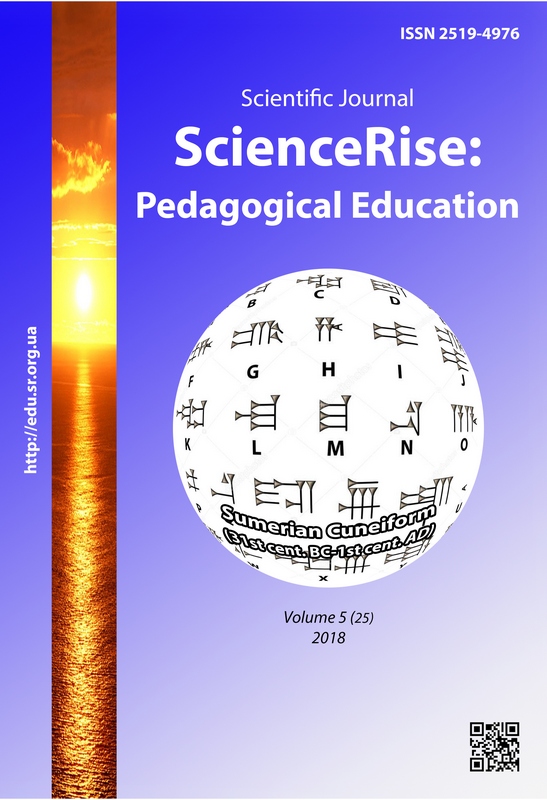Самоуправління професійним розвитком викладачів кафедр менеджменту польських закладів вищої освіти
DOI:
https://doi.org/10.15587/2519-4984.2018.133783Ключові слова:
веб-сайт, блог, електронне навчання, професійний розвиток, самоосвіта, саморозвиток, самоуправління, е-learningАнотація
Значні зміни, що стосуються нових технологій та їх застосування в усіх сферах життя, характеризують останні десятиріччя розвитку світової спільноти. Сучасний громадянин Європи та світу не може уявити собі функціонування в суспільстві без цифрових технологій, які стануть невід'ємною частиною комунікації, інформації та обміну досвідом і новими знаннями.
На сьогоднішній день професійний розвиток викладачів кафедр закладів вищої освіти Республіки Польща є актуальною проблемою, оскільки вимоги до них відображені в нормативно-правових актах і в документах закладів вищої освіти. Е-навчання стає дуже популярною формою отримання інформації та розвитку компетентності викладачів, враховуючи велику кількість обов'язків, яку вони виконують, і враховуючи швидкий розвиток інформаційно-комунікаційних технологій.
Слід зазначити, що 57,1 % інтерв'юйованих викладачів зазначили, що вони використовують електронне навчання в науково-дидактичних, дослідницьких та організаційних заходах, а 42,9 % викладачів використовують електронне навчання як студенти, які отримують нову інформацію, нові знання та вдосконалюють свої професійні навички, компетентність; 57,1 % викладачів відповіли, що вони використовували це при необхідності, 42,9 % викладачів відповіли «так» жоден не обрав відповідь «ні».
Самоуправління відіграє важливу роль у процесі професійного розвитку компетентності викладачів польських державних закладів вищої освіти. Навчання протягом усього життя займає важливе місце в самоуправлінні: курси, тренінги, семінари, післядипломна освіта, самоосвіта, блоги, веб-сайти, портфоліо. Аналіз анкетування вчителів та офіційних сайтів державних польських закладів вищої освіти дозволяє зробити висновок, що на сучасному етапі вчителі віддають перевагу цифровим технологіям та електронному навчанню на професійному рівні. Це стосується того факту, що така форма освіти економить час, гроші, передбачає розвиток різних форм і способів компетентності, без відриву від роботи. Як викладачі, так і студенти державних закладів вищої освіти Республіки Польща відзначають, що самоуправління професійним розвитком у майбутньому вони розглядають у формі електронного навчання
Посилання
- Sprawozdanie dla komisji Europejskiej Nowe sposoby uczenia sie i nauczania w szkolnictwie wyższym. (2014). Available at: http://www.erasmusplus.org.pl/wp-content/uploads/2015/11/Modernizacja-2015.pdf Last accessed: 11.05.2018
- Europejski System Edukacji Elearningowej. Available at: http://metodabls.pl/
- Otwarte zasoby edukacyjne. Available at: https://pl.wikipedia.org/wiki/Otwarte_zasoby_edukacyjne Last accessed: 11.05.2018
- Otwarta edukacja. Available at: http://koed.org.pl/pl/otwarta-edukacja Last accessed: 11.05.2018
- Ustawa z dnia 27 lipca 2005 roku. Prawo o szkolnictwie wyższym (Dz.U.Nr 164, poz. 1365 z pozniejszymi poprawkami). (2005). 83. Available at: http://prawo.sejm.gov.pl/isap.nsf/DocDetails.xsp?id=WDU20051641365
- Krol, H., Ludwiczynski, A. (2007). Zarzadzanie zasobami ludzkimi. Tworzenie kapitału ludzkiego organizacji. Warszawa: PWN, 468–473.
- Garski, K., Gontarz, J. (Eds.) (2009). Jak efektywnie szkolić pracownikow. Warszawa: PARP, 7.
- Listwan, T. (1998). Ksztalcenie kadry menedżerskiej firmy. Wroclaw: KADRY, 61.
- Jankowski, D. (2012). Tworczy rozwoj jednostki w calozyciowych procesach edukacji i samoedukacji. Dialog o Kulturze i Edukacji, 1 (1), 120–121.
- Koziol, M. (2013). Wykorzystanie e-learningu w procesie szkolenia malych i srednich przedsiębiorstw. Zeszyty Naukowe Malopolskiej Wyzszej Szkoly Ekonomii w Tarnowie, 22 (1), 48.
- Pestka, D. B., Kolodziej, J., Pujer, K. (2017). Rozwoj osobisty i zawodowy. Wybrane problemy teorii i praktyki. Wroclaw EXANTE, 111.
- Zapasa, A. (2011). Poradnik e-learningu. Swidnik, 16.
- Kopcial, P. (2013). Analiza metod e-learningowych stosowanych w kształceniu osob doroslych. Zeszyty Naukowe Warszawskiej Wyzszej Szkoly Informatyki, 9 (7), 82–84.
- Koziol, L. (2013). Determinanty rozwoju e-learningu korporacyjnego. Zeszyty Naukowe Uniwersytetu Humanistyczno-Przyrodniczego w Siedlcach, 98, 64–65.
##submission.downloads##
Опубліковано
Як цитувати
Номер
Розділ
Ліцензія
Авторське право (c) 2018 Iryna Androshchuk

Ця робота ліцензується відповідно до Creative Commons Attribution 4.0 International License.
Наше видання використовує положення про авторські права Creative Commons CC BY для журналів відкритого доступу.
Автори, які публікуються у цьому журналі, погоджуються з наступними умовами:
1. Автори залишають за собою право на авторство своєї роботи та передають журналу право першої публікації цієї роботи на умовах ліцензії Creative Commons CC BY, котра дозволяє іншим особам вільно розповсюджувати опубліковану роботу з обов'язковим посиланням на авторів оригінальної роботи та першу публікацію роботи у цьому журналі.
2. Автори мають право укладати самостійні додаткові угоди щодо неексклюзивного розповсюдження роботи у тому вигляді, в якому вона була опублікована цим журналом (наприклад, розміщувати роботу в електронному сховищі установи або публікувати у складі монографії), за умови збереження посилання на першу публікацію роботи у цьому журналі.









